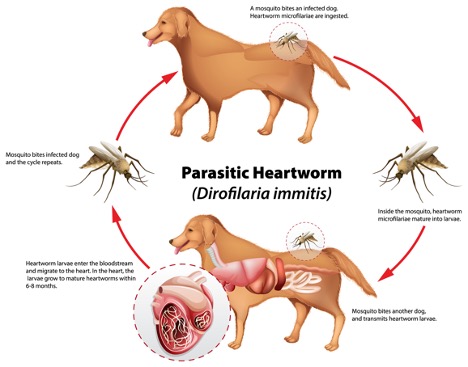Heartworm disease is a severe and life-threatening condition for pets, caused by parasitic worms transmitted to a pet from a mosquito bite. Fortunately, we can prevent heartworm disease with the proper measures and treatment methods, so it’s essential to understand the signs and symptoms of infection and the steps to prevent infestation.
What is Heartworm Disease?
Heartworm disease is an infectious parasitic disease caused by worms living in the heart and lungs of an animal. These worms reproduce and grow over time, seriously damaging the heart and other major organs. Infection most commonly affects dogs, ferrets, and sometimes cats. Left untreated, it results in death in pets.
The Heartworm Cycle

When a mosquito bites an animal infected with heartworms, it sucks up the microscopic heartworm larvae (microfilariae). These larvae continue to develop in the mosquito, and the mosquito deposits the parasite into its next victim.
Symptoms of Heartworm Disease
While dogs, cats, and ferrets can share some heartworm symptoms, symptoms can differ between species.
| Dogs | Cats | Ferrets |
| Mild persistent cough Reluctance to exercise Fatigue after moderate activity Decreased appetite Weight loss
| Difficulty or labored breathing Vomiting Decreased activity Loss of appetite Weight loss Convulsions. Blindness. Fluid in the lungs
| Decreased activity Coughing Trouble breathing Overall weakness Heart failure can occur in severe cases |
Diagnosing Heartworm Disease in Pets.
Our clinic provides a wide variety of in-house diagnostic testing with the most state-of-the-art technology available. It is our goal to provide your pet with the highest level of care possible, and our diagnostic tools help us do that.
To diagnose heartworm disease in your pet, we typically use a series of tests to determine the presence of adult heartworms or larvae. We use an antigen test to detect the presence of proteins released by adult female heartworms. We can also perform an antibody test to check for antibodies created by your pet’s immune system in response to an infected mosquito bite. We use chest X-rays to visualize a pet’s heart and lung tissue. If any of these tests detect the presence of heartworms, we may recommend additional tests to assess the severity of the infection.
Treating Heartworm Disease in Pets.
When treating heartworm disease, we consider your pet’s species, age, size, and overall health before treatment. Generally, standard treatments involve giving a series of closely monitored injections or administering oral medication over a short period. Depending on the severity of the infestation and your pet’s risk factors for developing complications, we may recommend additional testing to monitor the treatment. Regular checkups with your veterinarian are essential for monitoring progress and ensuring the success of a heartworm infection treatment plan.
Important note regarding ferrets: Unfortunately, there is no approved drug therapy for heartworm infection in ferrets. The drug used to treat infections in dogs is not safe for ferrets. However, we can often help ferrets with good veterinary care. You can read more about Heartworm in Ferrets from the American Heartworm Society.
Managing Post-Infection Symptoms.
After treatment, your pet will need close monitoring to minimize the risk of further complications. Symptoms such as weight loss, weakness, and lethargy may accompany heartworm infection initially. These may persist for several weeks or months after treatment due to the inflammation and damage caused by the worms in your pet’s body. Depending on the length and severity of the infection, additional treatments may be necessary to ensure continued health post-infection. Regular checkups with your veterinarian are essential in identifying any potential risks.
Heartworm Prevention
Prevention is the best protection against heartworm disease in your dog, cat, or ferret. Year-round preventive medications can help protect your pet from becoming infected with heartworms.
You can also reduce the risk of infection by avoiding areas known to have infected mosquitoes and other animals.
- Temporary pools and ponds are created by melting snow or rain.
- Floodplains along streams and riverbanks.
- Irrigated fields and meadows.
- Containers that hold water and fill up after a rain shower.
- Tree holes that collect rainwater.
Additionally, make sure you bring your pet to Braescroft Clinic for regular heartworm tests on your pet so we can detect any early signs of infection.
Final Words
Heartworm disease is a serious, progressive disease but fortunately preventative. The earlier it is detected, the better the chances a pet will recover. By working together, we can help protect your pet from any serious or fatal consequences of the disease. Please contact us to schedule an exam or preventative treatment.
Your Friendly Team at
Braescroft Animal Clinic





